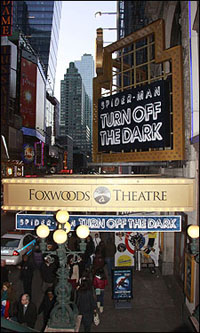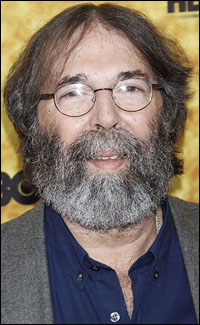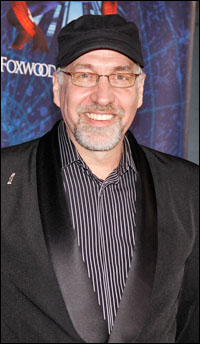
Since the official opening on June 14, 2011, however, the most newsworthy Spider-Man stories (aside from the regular smashing of box-office records) have been born in courtrooms and lawyers' offices. The musical may have inspired more lawsuits than any show in Broadway history. The suits are so numerous, it's hard to keep them straight. So, as a service, Playbill.com has created a timeline, so you can keep tabs on who's being served.
| |
 |
|
| Julie Taymor | ||
| Photo by Joseph Marzullo/WENN |
JUNE 9, 2011: The Stage Directors and Choreographers Society filed an arbitration claim against Spider-Man Broadway, LLC, the producer of Spider-Man: Turn Off the Dark, for failure to pay royalties to Julie Taymor.
SEPT. 29, 2011: An arbitration hearing between dismissed Spider-Man Turn Off the Dark director Julie Taymor and the show's producers is scheduled to begin the week of Oct. 3. Taymor, who has been working on the spectacle for almost a decade, claims she is owed $500,000 in unpaid royalties for her work. The Times reports that the producers will claim that Taymor was in breach of contract.
| |
 |
|
| Photo by Joseph Marzullo/WENN |
| |
 |
|
| Michael Cohl | ||
| Photo by Joseph Marzullo/WENN |
JAN. 17, 2012: In response to Taymor's Nov. 8 suit, the producers of Spider-Man Turn Off the Dark file an answer and countersuit in the U.S. District Court for the Southern District of New York against the director and her company, LOH, Inc. The producers' counterclaims assert that although Taymor was contracted to co-write and collaborate on the musical, she refused "to fulfill her contractual obligations, declaring that she could not and would not do the jobs that she was contracted to do." The counterclaims assert that because of "the delays and increased expense due to Taymor's actions," the producers had to hire other individuals "in order for the show to survive, and for it to continue to provide jobs to the cast and crew and allow investors to recoup their investment." They further claim that Taymor's copyright claims are baseless. The producers also file an antitrust lawsuit against the Stage Directors and Choreographers Society, Inc., LOH, Inc. and Taymor.
| |
 |
|
| Philip Wm. McKinley | ||
| Photo by Joseph Marzullo/WENN |
FEB. 17, 2012: Producers announced Feb. 16 that they have reached a settlement with The Stage Directors and Choreographers Society. The producers have agreed to pay Julie Taymor "full royalties for her director services for the New York production of Spider-Man Turn Off The Dark, from the inception of the run through its duration pursuant to the terms of her Director's agreement, and to pay certain other amounts due to Ms. Taymor as a Collaborator, when the show's New York production recoups." The parties also reached an agreement with regard to compensation owed for subsequent productions. Taymor, according to the New York Times, will be paid $9,750 a week in royalties for the remainder of the show's Broadway run. The SDC, meanwhile, agrees that Taymor's services as a director and collaborator are completed, and that she will have no further involvement with the show in those capacities. All claims of breach on contract by the parties in the arbitration are withdrawn.
MARCH 2, 2012: A 46-page filing by Taymor in federal court is notable for revealing a long list of embarrassing, formerly private e-mails sent by the show's principals.
| |
 |
|
| Richard Kobak | ||
| Photo by Joseph Marzullo/WENN |
JUNE 1, 2012: The first oral arguments are made in Taymor's federal suit against Spider-Man producers. According to the Times, lawyers for the Broadway producers argued that Taymor "had borrowed so many ideas from Spider-Man superhero lore that she was not entitled to copyright protection for her initial three-page script outline for the musical." (Dale Cendali, the lead lawyer for the producers, dismissed the outline as little more than a "rip-off.") Taymor's lawyers, "who regard the outline as crucial to her copyright claims and battle for more than $1 million from the producers, countered that the document reflected what they termed originality and the singular vision that she had demonstrated as the Tony Award-winning director of The Lion King." Private settlement talks broke off in late winter.
As of press time, the federal proceedings were ongoing. A jury trial on the case is to start in early 2013.









